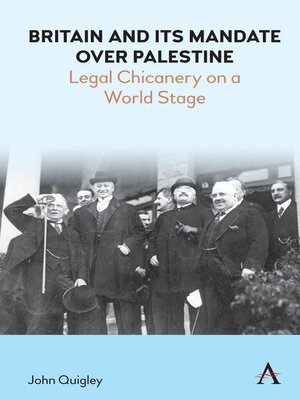
Sign up to save your library
With an OverDrive account, you can save your favorite libraries for at-a-glance information about availability. Find out more about OverDrive accounts.
Find this title in Libby, the library reading app by OverDrive.



Search for a digital library with this title
Title found at these libraries:
| Library Name | Distance |
|---|---|
| Loading... |
Analysis of Britain's role in Palestine has proceeded on the assumption that Britain was lawfully in control of the territory. Analysts differ on whether what it did was proper, but they agree that Britain had a lawful mandate and that through the League of Nations, and that the international community advocated for Jewish territorial rights in Palestine. This analysis, though widely shared, is incorrect. Britain had no territorial rights itself to govern Palestine. It was there by dint of force of arms. The mandate it had over Palestine was initiated unilaterally. The mandate was not given to Britain by the League of Nations. The League of Nations had no authority over Palestine and, in particular, nothing it could give to Britain. The document that Britain composed for the governance of Palestine was never approved by the League of Nations. When, in 1947, Britain had to explain the United Nations its legal status in Palestine, it resorted to distorting the historical facts, in an effort to make it appear it had been in Palestine lawfully.
|Britain's role in Palestine has never before been analyzed by close scrutiny of its legal status. Britain's relation to the League of Nations has been analyzed only at a superficial level. Most authors say without proof that Britain was given Palestine by the League of Nations, or that the League of Nations required Britain to implement a Jewish national home. This book is ground-breaking as the first to look deeper into these issues, and to show that the commonly accepted analysis is historically incorrect.
This book makes four new points about Britain's role in Palestine. Britain had no legal basis for its tenure in Palestine. No right to self-determination for the Jewish people was recognized by the international community. The mandate document that Britain composed was not legally valid. The League of Nations gave no rights either to Britain or to the Jewish people.
The predominant analysis on the period of British control by authors who take a Zionist perspective is that the international community accepted a Jewish entitlement in Palestine. The predominant analysis by authors who take an Arab perspective is that Britain violated Arab rights by not complying with the requirements imposed by the League of Nations. This book challenges both of these approaches, because neither set of authors asks whether what Britain was doing rested on a solid legal foundation.
To make its point, the book draws on documentation from the 1920s that others have overlooked, whether they be pro- or anti-Zionist. The most explosive item – one that has hidden in plain view for one hundred years – is a pleading the British Government filed in the Permanent Court of International Justice admitting that it was in Palestine only by dint of military conquest and that it had no other legal basis.







